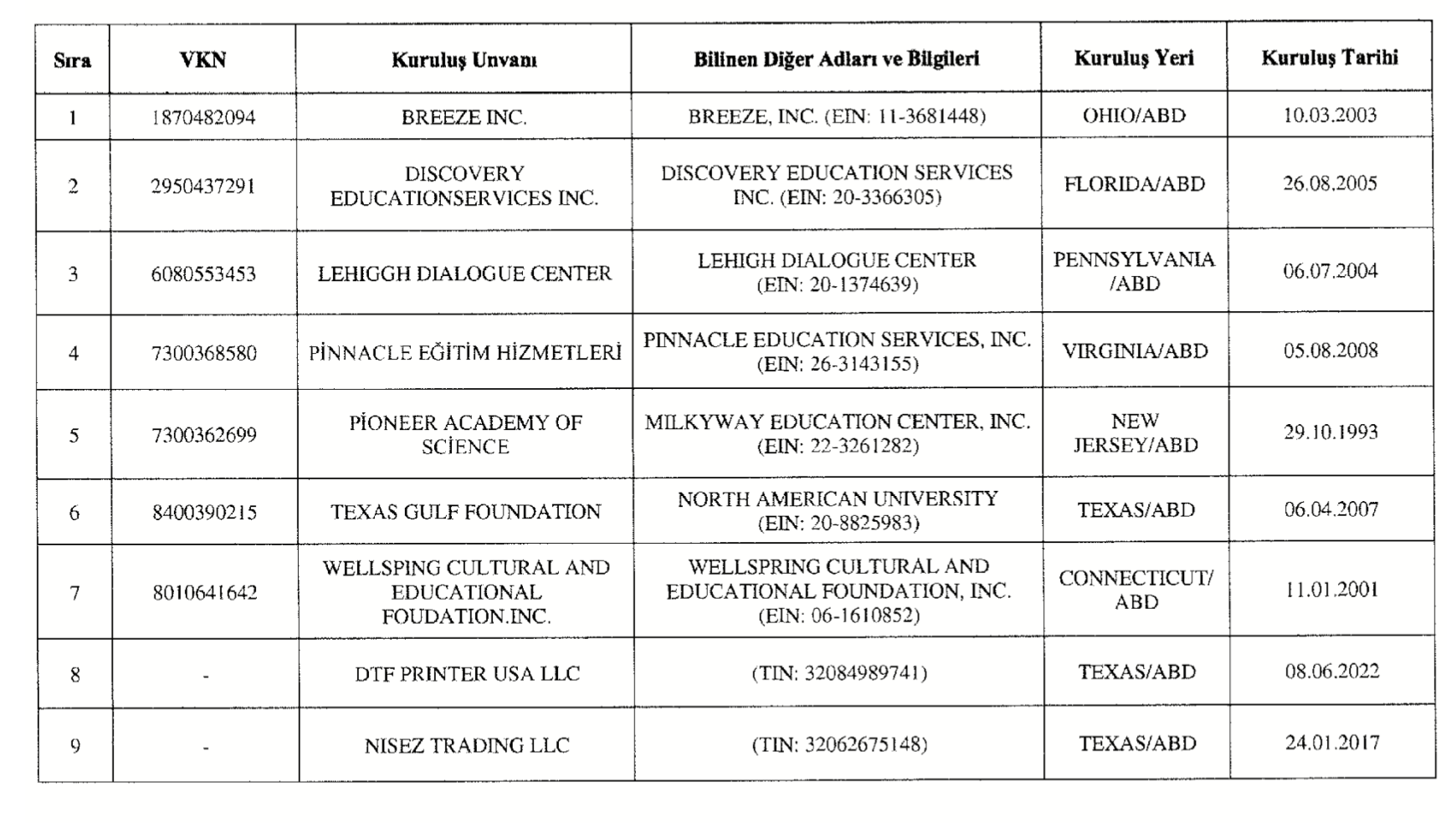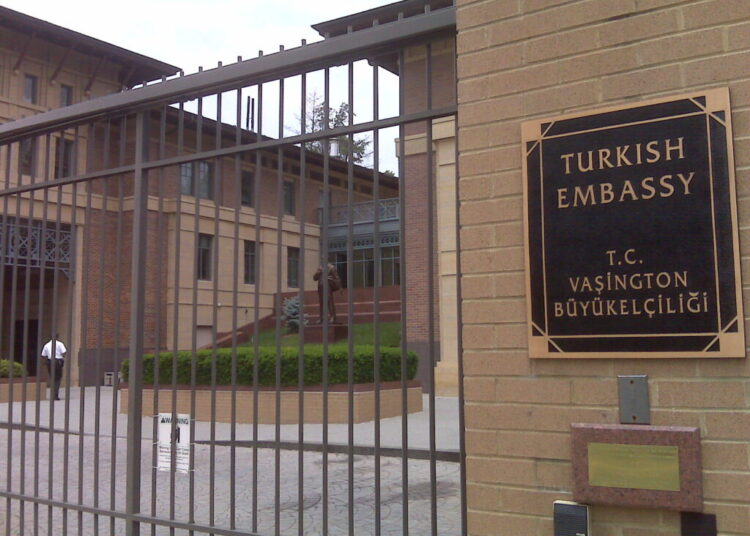Levent Kenez/Stockholm
The Turkish government on January 7 froze the assets of nine US-based organizations including six educational foundations accused of links to the Gülen movement, a group critical of Turkish President Recep Tayyip Erdogan, under the guise of “combating terrorism financing.” These asset freezes mark the latest development in the Erdogan government’s ongoing surveillance operations targeting dissidents in the US.
Documents previously published in 2021 by Nordic Monitor revealed that Turkish diplomatic missions in Washington, New York, Houston and Chicago engaged in systematic spying on critics of the Erdogan government. These diplomats collected detailed intelligence on the activities of individuals and organizations, including schools, nonprofits and cultural foundations, and sent the information to Ankara. This intelligence, gathered under the directive of the Turkish National Police’s Anti-Smuggling and Organized Crime Department (KOM), was subsequently used to initiate criminal cases in Turkey.
Among the organizations that were spied on by Turkish diplomats were schools, companies, nongovernmental and not-for-profit organizations and foundations located in New York, Washington, D.C., Georgia, Pennsylvania, Texas and Chicago. They are believed to be run by people who are major critics of the government in Turkey.
The information supplied by the Turkish diplomats was used in a sham criminal investigation under case file No.2014/156758 in Turkey, where the school director was listed as a suspect on fabricated charges.
Published in the Official Gazette on January 7, a listing of US-based foundations and companies whose assets were frozen.

Documents published by Nordic Monitor included the Milkyway Education Center, Wellspring Cultural and Educational Foundation, Inc. and North American University, whose assets were frozen on January 7.
The Milkyway Education Center, which operates the Pioneer Academy in New Jersey, was specifically noted for its students’ participation in federal science competitions and their receipt of awards. The Turkish diplomats’ report expressed concern over the growing interest the school of local and state officials, with numerous prominent figures attending the school’s intercultural events. This information was not only shared with Ankara but is also part of a criminal case being pursued in Turkey.
The Wellspring Cultural Educational Foundation, Inc., founded in 2001 in West Haven, Connecticut, was another organization profiled by Turkish diplomats. The administrators of the foundation, which focuses on education and promotes intercultural and interfaith dialogue, were listed in the intelligence report sent to Ankara.
Additionally, North American University, based in Stafford, Texas, and offering majors in fields such as computer science, education and business administration, was also mentioned in the Turkish Foreign Ministry document. These organizations are now facing the consequences of being targeted by Turkish intelligence, with their activities scrutinized as part of an ongoing investigation that appears to be politically motivated.
Profiling document prepared by Turkish diplomats on educational institutions in the United States:
The Turkish government’s decision on January 7 may lead to the initiation of terrorism investigations into Turkish citizens who had been employed by these US-based organizations.
However, the US government has rejected the arguments put forward by President Erdogan’s administration that are used to justify terrorism investigations into members of the Gülen movement. US authorities have found these claims to be lacking a legal basis.
According to a Nordic Monitor report published on March 12, 2024, the US Department of Justice rejected Turkey’s request for legal assistance in obtaining the testimony of a Turkish dissident in a terrorism investigation. Turkey requested that US authorities ensure the dissident’s participation in a video conference scheduled for March 7, as part of allegations tied to the Gülen movement, which the Turkish government considers a terrorist organization. However, US officials declined, citing first amendment protections of free speech and association and noting the lack of substantial evidence or a credible threat of violence.
According to a document shared by journalist Adem Yavuz Arslan, a Turkish citizen visiting the Turkish Embassy in Washington was denied consular services because he had been previously profiled by the embassy as a critic of President Erdogan. Additionally, his presence in the US was reported to Ankara. Such actions are part of a broader campaign in which critics abroad, especially those linked to the Gülen movement, have faced passport revocations, property confiscations in Turkey and risks of criminal charges for their families.
The European Court of Human Rights (ECtHR) has also criticized Turkey’s approach. In September 2023 the ECtHR ruled that the conviction of a teacher on alleged terrorist links, based solely on the use of a messaging app and an account at a Gülen-affiliated bank, violated human rights.
This is not the first case of Turkish diplomats allegedly monitoring dissidents abroad. Reports indicate that Turkish diplomatic missions in the US have engaged in surveillance of critics, including gathering personal information and reporting activities back to Ankara. Previously leaked documents revealed that in 2016-2017 alone, Turkish embassies profiled over 4,000 dissidents, sharing this information with Turkish intelligence and law enforcement agencies for further legal action.
Correspondence regarding CDs containing the names of more than 4,000 Turkish citizens living abroad, handed over by diplomats to the Ankara Chief Public Prosecutor’s Office for the initiation of a terrorism investigation:
The Turkish government claims that Fethullah Gülen, the spiritual leader of the movement who died in Pennsylvania on October 20, 2024, masterminded a coup attempt in Turkey in 2016.
Meanwhile, former US national security advisor John Bolton rejected the claims made by Erdogan that Gülen orchestrated the 2016 coup attempt, describing these accusations as part of a broader propaganda effort to strengthen Erdogan’s grip on power. Bolton also denied any involvement of the United States in the coup, a suggestion previously made by Erdogan and his associates.
In an interview on December 17, 2024 with Turkish journalist İbrahim Haskoloğlu, Bolton criticized Erdogan’s portrayal of Gülen, a Turkish cleric who resided in the US until his death in October. Gülen had founded a global civic movement that Turkey labels as a “terrorist organization.” Bolton argued that Erdogan’s narrative was a calculated strategy to justify the government’s harsh actions against opposition groups. He further criticized the evidence presented by Turkey in its request for Gülen’s extradition, calling it inadequate for any legal proceedings.












